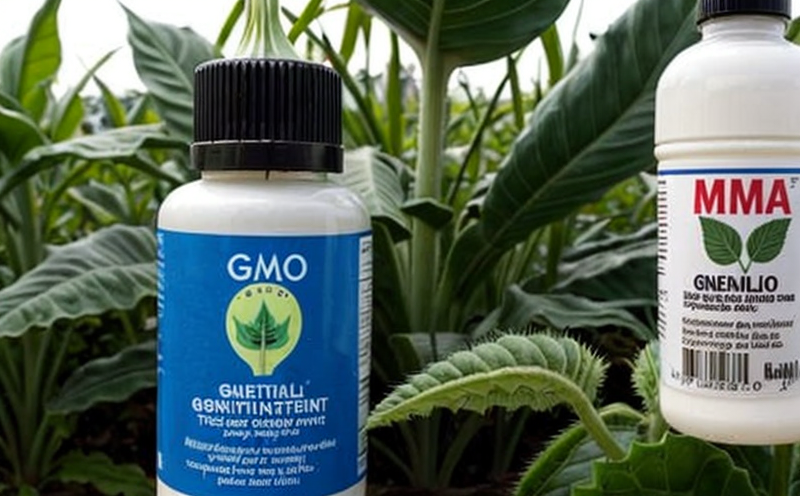ISO 32659 GMO Quantification in Meat Alternatives
In recent years, the meat alternatives market has seen rapid growth. Consumers are increasingly seeking plant-based options as a means to reduce their environmental impact and improve health outcomes. However, this trend also presents challenges for manufacturers who must ensure that their products meet strict regulatory requirements regarding genetically modified organisms (GMOs).
The ISO 32659 standard provides a robust framework for quantifying GMO content in food products, including meat alternatives. This service focuses on the specific application of this standard to products like plant-based burgers and sausages, which are designed to mimic the taste, texture, and nutritional profile of traditional animal-derived meats.
The process begins with sample preparation, where raw materials such as soy, peas, lentils, or other legumes are blended into a form that can be analyzed. The chosen method for quantification typically involves DNA extraction followed by PCR amplification targeting specific GMO markers. This approach ensures accurate identification and quantification of any genetically modified ingredients present in the final product.
Given the complexity of modern food formulations, it is crucial to consider not only the presence but also the extent of genetic modifications within these products. Understanding this information allows manufacturers to make informed decisions about labeling practices, ensuring transparency with consumers while complying with international regulations.
The importance of accurate GMO quantification extends beyond mere compliance; it plays a key role in maintaining consumer trust and confidence in brand integrity. Consumers are more likely to purchase products from companies that demonstrate a commitment to responsible sourcing and production processes.
Furthermore, understanding the specific types and levels of GMOs present helps guide product development efforts aimed at creating healthier or more sustainable alternatives without compromising flavor or texture.
Our laboratory utilizes state-of-the-art equipment and methodologies to perform these analyses efficiently and accurately. By leveraging advanced techniques such as real-time PCR technology, we can deliver precise results that meet the stringent demands set forth by ISO 32659.
This service not only aids in meeting regulatory requirements but also supports ongoing research into improving product formulations while adhering to ethical standards surrounding genetically modified organisms.
Why It Matters
The global demand for meat alternatives continues to rise, driven by factors such as environmental concerns, health considerations, and dietary preferences. As manufacturers enter this competitive market space, they face increasing pressure to prove their products meet high standards of quality and safety.
GMO quantification is one aspect that directly impacts consumer trust and brand reputation. Misleading or inaccurate labeling can lead to legal repercussions as well as loss of customer confidence. Therefore, ensuring compliance with relevant international standards like ISO 32659 becomes essential for maintaining integrity in the supply chain.
For R&D teams within food companies, knowing exactly what GMOs are present and at what levels allows them to refine formulations based on scientific data rather than assumptions or guesswork. This level of precision can lead to innovations that better satisfy consumer expectations while staying true to core values around sustainability and ethical sourcing.
Compliance officers play a critical role in managing the risks associated with non-compliance, especially when dealing with global markets where different jurisdictions have varying rules regarding labeling requirements for GMOs. By working closely with our laboratory during product development stages, these professionals can stay ahead of potential issues before they arise.
For procurement teams involved in sourcing raw materials used in meat alternatives production, accurate GMO quantification provides valuable insights into supplier reliability and adherence to ethical practices. This knowledge enables them to build stronger relationships with trusted partners who share similar commitments towards responsible business operations.
Scope and Methodology
| Sample Preparation | Extraction Procedure | DNA Amplification | Data Analysis |
|---|---|---|---|
| Raw materials are blended into a homogenous mixture suitable for DNA extraction. This step ensures consistent results and reduces variability between samples. | Aqueous two-phase extraction (ATPE) is used to isolate DNA from the sample matrix, followed by purification steps using commercial kits designed specifically for low biomass samples. | Real-time PCR targeting known GMO markers allows quantification of transgenic content. The assay uses SYBR Green dye for fluorescence detection during amplification cycles. | Raw data is analyzed using specialized software to generate concentration values corresponding to the amount of GMO present in each batch tested. These results are then compared against established thresholds defined by regulatory bodies. |
The process outlined above adheres strictly to ISO 32659 guidelines, providing reliable and reproducible quantification of GMOs across various types of meat alternatives.
Quality and Reliability Assurance
To ensure the highest standards of accuracy and precision in our testing services, we employ rigorous quality control measures throughout every stage of analysis. Our laboratory is accredited to ISO/IEC 17025:2017, ensuring compliance with international best practices for calibration and operation.
Before any test begins, all reagents are validated according to manufacturer specifications, and equipment undergoes regular maintenance checks and calibrations. This approach minimizes errors due to instrument malfunction or improper chemical use.
During sample preparation, quality assurance personnel oversee procedures to prevent contamination or degradation of the samples. They also verify that all steps align with established protocols outlined in ISO 32659.
Data analysis is conducted by trained professionals who utilize robust software tools designed specifically for handling complex biological data sets generated from PCR reactions. Each result undergoes multiple layers of review and validation before being reported back to clients.
We understand that timely delivery of accurate reports is vital for our customers' operations. Therefore, we strive to process samples swiftly while maintaining the highest levels of accuracy and reliability.





